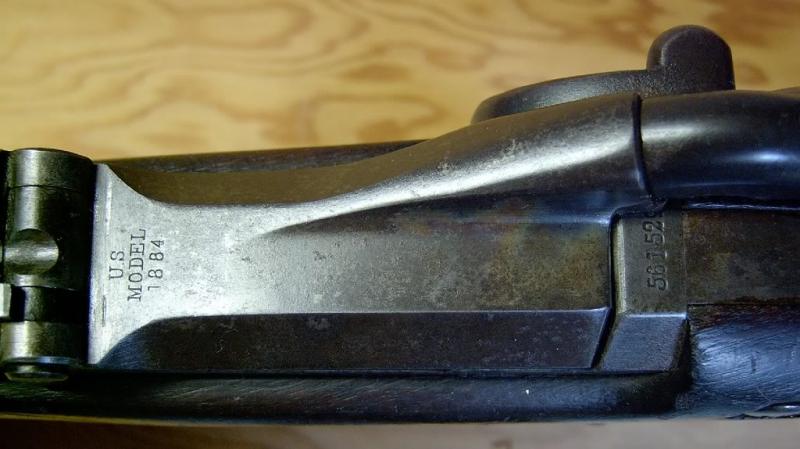- Your serial number indicates that your Springfield model 1873 trap door model rifle was made in the year 1885.I would check to see if you have the next model,which was the model 1884.
- Serial numbers for 1873 Springfield started at 1, according to Flayderman, so you are ok there. They did not apply proof marks to the barrel until no 50,000. Maybe yours was refurbished and re-proved; the Army sure wasn't throwing away usable guns or parts in those days. Caliber is.45-70 Government.
| Springfield model 1884 | |
|---|---|
| Type | Breech-loading rifle |
| Place of origin | United States |
| Service history | |
| Used by | United States Army |
| Wars | Indian Wars, Spanish–American War, Philippine–American War |
| Production history | |
| Designed | 1884 |
| Manufacturer | Springfield Armory |
| Specifications | |
| Length | 51.875 in (1,317.6 mm) |
| Barrel length | 32.625 in (828.7 mm) |
| Cartridge | .45-70-500 |
| Action | Hinged breechblock |
| Rate of fire | Approx. 10 rounds a minute |
| Muzzle velocity | 1,315 feet per second (401 m/s) |
Covering numbers: 1 - 567834. Please enter a serial number and click the submit button.
The Springfield model 1884 was one of the 'Trapdoor Springfield' rifles. It was an improved replacement for the previous longarm of the U.S. Armed Forces, the Springfield model 1873.
Description[edit]
The model 1884 traces its roots back to the design of the Springfield 1873. The model 1884 incorporated a significant number of improvements that had been made between 1878 and 1879. It also featured a serrated trigger that had been incorporated into the Springfield rifle design in 1883.
Behringer x1222usb driver download mac. The most dramatic change to the rifle design, which is often considered to be the identifying feature of the model 1884, was a new rear sight which had been designed by Lieutenant Colonel Adelbert R. Buffington of the U.S. Army Ordnance Department. This sight however was not perfected until 1885.
The principal feature of this new sight was a rack and pinion style windage adjustment. Unlike previous sights, the base was not used for any position other than point blank. The raised leaf had graduations from 200 to 1400 yards. A new barrel band was also designed to accommodate this new sight so that it could lie flat in the point blank position.[1]
Marksmen generally favored the new sight, but general troops were less enthusiastic about it and often considered it to be an annoyance.
The model 1884 was also produced in a carbine version. It was found that the rear sight could be easily damaged when removing the rifle from the carbine boot. The rear barrel band was therefore modified in 1890 to include a rear sight protector.
A round-rod bayonet model was also produced, designated the Model 1888. This, like the Springfield model 1880, was an attempt to combine the cleaning rod and bayonet into a single unit. Cpu n270. The Model 1888 included an improved retaining mechanism, as the Model 1880's retaining mechanism had proved to be problematic.
See also[edit]
References[edit]

- ^'Uniforms, arms, and equipment: the U.S. Army on the Western Frontier, 1880-1892' By Douglas C. McChristian
1873 Springfield Trapdoor Rifle Serial Numbers
